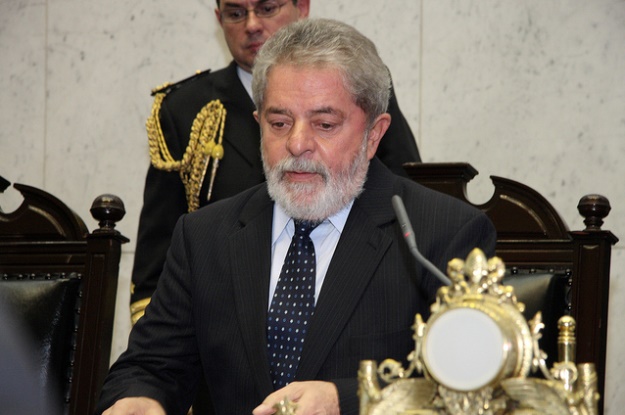This piece was updated on March 7.
The next week will be critical to the future of Brazilian democracy. The temporary detention of former President Luiz Inácio Lula da Silva for questioning related to the Petrobras probe is indeed a sign that no one in Brazil is above the law. But it also brings the risk of extreme polarization and even violence – with the leader of the Workers’ Party in Congress calling for “war,” trade union leaders denouncing a “coup” and Lula’s supporters and opponents both planning huge nationwide marches for Sunday, March 13.
Brazil is not Venezuela – it is a large country with robust and functioning democratic institutions, a strong appreciation for pluralism and little recent history of political violence. But it’s also true that Lula is no ordinary politician. He is, rather, a unique symbol in a way that is often difficult for foreigners (and some Brazilians) to appreciate.
Indeed, Lula was the first working-class president in a country where inequality is still the central fact of daily life. His election in 2002 was so poignant because it marked the first time someone from Brazil’s socioeconomic majority ascended to such a position of power. He left office in 2010 with an approval rating of nearly 90 percent, and the belief that Brazil had taken an important step toward becoming a more equal society. Today, Lula’s image has been greatly tarnished by multiple scandals and the collapse of the economy after he left office. Yet, even now, he remains the only relevant politician in the lives of many Brazilians, especially the poor and those outside major cities. They remember him, rightly or wrongly, as the leader who brought them into the mainstream economy and political life for the first time.
Lula’s unique status is absolutely no reason to shield him from scrutiny or prosecution. It also does not mean he is being “persecuted” by Brazil’s elite, as some of his supporters are claiming. The “Lava Jato” probe of crimes at Petrobras has to date been serious and credible, despite questions over prosecutors’ use of preventive detention and the allegedly heavy-handed nature of the federal police’s sweep of Lula’s institute and other locales on Friday. A police statement accusing Lula of being “one of the main beneficiaries” of crimes at Petrobras was arguably bigger news than the detention itself. “There is evidence that the crimes enriched him and financed electoral campaigns and the treasury of his political group,” the police said.
However, Lula’s special place in history does explain why Friday’s events mark the start of a completely new chapter in Brazil’s current crisis. It helps explain the high emotions on all sides. Raising the stakes even further, of course, is the fact that Lula’s chosen successor President Dilma Rousseff is fighting for her own political survival because of the same scandal. Friday’s events, when added to other recent developments such as the arrest of the guru of her two winning campaigns, substantially increase the odds that she will be either impeached or otherwise removed from office.
So here’s the worrying part: The rhetoric on all sides is running dangerously hot, more reminiscent of Caracas than the Brasilia of the past 20 years. The CUT, a large labor confederation, issued a statement calling for its unions to “immediately initiate the fight to stop this coup.” Facebook and Twitter, both of which are particularly popular in Brazil, were flowering with unnecessarily vicious anti-Lula statements, many of them tinged with class hatred. Videos have already surfaced of confrontations between pro- and anti-Lula crowds in São Paulo. Meanwhile, a huge anti-Rousseff march previously planned for Sunday threatens to be a flash point. Some Workers’ Party supporters have declared their intention to hold rallies in the exact same place, and others have angrily vowed the “streets will be ours” that day. Clashes seem possible, and serious Brazilian commentators were warning of the risk of “Venezuela-ization” in coming hours and days.
There is another path, though. Soon after Lula was taken for questioning, the Workers’ Party’s official Twitter account called Lula a “political prisoner” and incited his supporters to “react.” Shortly thereafter, the tweet was apparently deleted – presumably by someone who said “Hey, we should be careful here.” Let’s all hope that similar voices prevail throughout Brazil – that Lula has his opportunity to defend himself, that people on all sides scale down their rhetoric, and that everyone avoids unnecessary confrontation. It’s true that Brazil isn’t Venezuela, and that coming days could in fact see further steps toward it becoming a cleaner, less corrupt, more democratic country. But it’s moments like these that define the course of nations. Not so long ago, Venezuela wasn’t Venezuela either.
—
This piece was updated to reflect recent events.
Winter is editor-in-chief of AQ.









